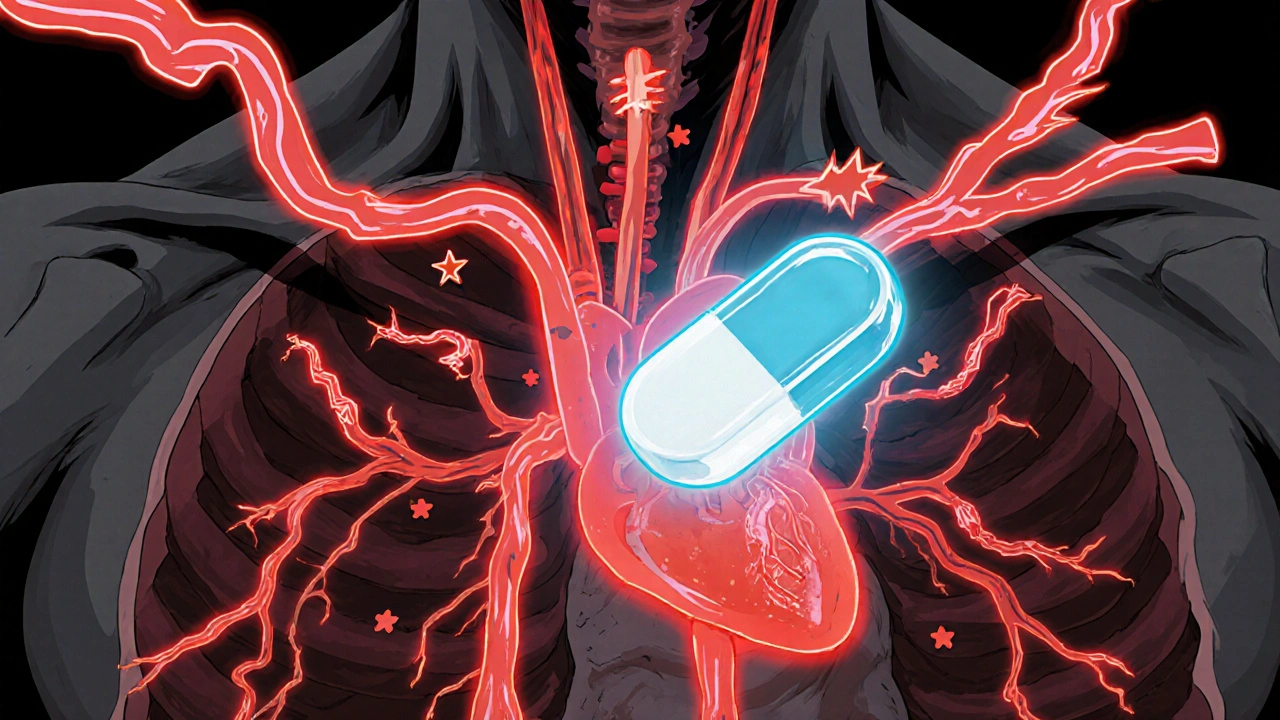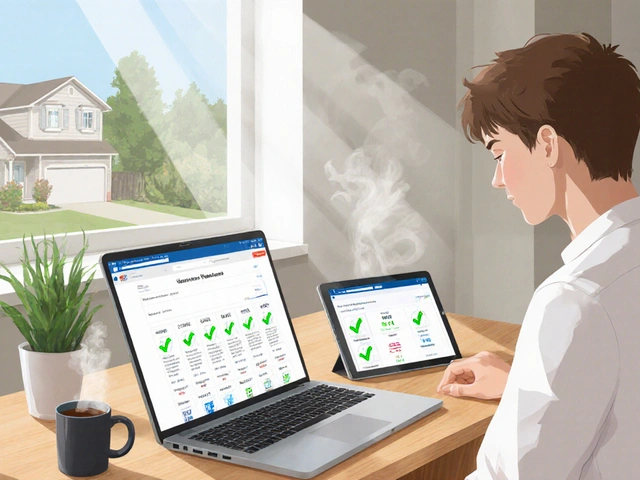Living with chest pain or the risk of a heart attack can make daily stress feel like an extra weight. If you’ve been prescribed Isosorbide mononitrate a long‑acting nitrate that widens blood vessels and eases the heart’s workload, you probably wonder how stress fits into the picture. This guide breaks down what the drug does, why stress matters, and what you can do right now to keep both your heart and mind in better shape.
Key Takeaways
- Isosorbide mononitrate relieves angina by dilating blood vessels and lowering heart strain.
- Stress spikes cortisol, which can trigger chest pain and blunt the drug’s effectiveness.
- Simple habits-deep breathing, short walks, and consistent sleep-work well alongside the medication.
- Watch for side effects like headaches, low blood pressure, or sudden chest pain and call your doctor promptly.
- Regular check‑ins with a healthcare professional keep dosage and stress‑control strategies on track.
What Is Isosorbide Mononitrate?
Isosorbide mononitrate belongs to the nitrate class of medicines. It’s taken once or twice daily as a tablet, and its main job is to keep the coronary arteries relaxed, allowing more blood to flow to the heart muscle. Because it works over a 12‑ to 24‑hour period, it’s often used for chronic angina rather than immediate relief.
Typical dosage: Adults start at 20 mg once a day, gradually moving up to 60 mg if needed. The exact amount depends on age, kidney function, and how well you tolerate the drug.
Common side effects include mild headaches, dizziness, and flushing. These usually fade after a week as the body adjusts. More serious reactions-such as severe low blood pressure, fainting, or a rapid heart rate-require immediate medical attention.
Because nitrates widen vessels, they can interact with other blood‑pressure‑lowering drugs (e.g., beta‑blockers or ACE inhibitors). Always tell your doctor about every medication you take, including over‑the‑counter supplements.
How Stress Affects Angina and Nitrate Therapy
Stress isn’t just a feeling; it triggers a cascade of hormones, especially cortisol. Elevated cortisol makes blood vessels more reactive, raising blood pressure and heart rate-both of which can provoke angina episodes.
When you’re under chronic stress, the heart works harder, and the benefit of isosorbide mononitrate may be partially offset. In other words, the drug opens the pipes, but stress can turn the faucet on full blast.
Research from the American Heart Association (2024) shows that patients who practice regular stress‑reduction techniques experience up to a 30 % reduction in angina frequency, even while staying on the same nitrate dose.
Key physiological links:
- Cortisol increases heart contractility.
- Stress‑induced sympathetic activation raises blood pressure and heart rate.
- Endothelial dysfunction from chronic stress reduces the vessels’ ability to respond to nitrates.

Practical Stress‑Management Strategies That Play Well With Your Medication
Below are evidence‑backed habits you can start today. They’re low‑cost, easy to fit into a busy schedule, and have been shown to improve heart health without interfering with nitrate therapy.
- Deep‑breathing (5‑minute box breathing)
- Inhale for 4 seconds, hold for 4, exhale for 4, hold for 4.
- Repeats for 5 minutes-ideally before meals or bedtime.
- Short, brisk walks
- 10‑minute walk at a pace that lets you talk but not sing.
- Boosts nitric oxide production naturally, complementing the drug.
- Mindfulness meditation
- Use a guided app for 10 minutes daily.
- Reduces cortisol by ~15 % after 8 weeks (study, 2023).
- Sleep hygiene
- Aim for 7-8 hours, keep the bedroom cool, avoid screens 30 minutes before bed.
- Quality sleep lowers nighttime blood pressure spikes.
- Limit caffeine and alcohol
- Both can provoke vasodilation and increase heart rate, potentially worsening headaches from nitrates.
These practices can be mixed and matched. The goal is consistency-not perfection. Even a few minutes a day add up over weeks.
When to Call Your Doctor
Side effects that need prompt attention include:
- Sudden, severe chest pain that doesn’t improve with rest.
- Persistent dizziness or fainting.
- Rapid heart rate (>120 bpm) at rest.
- Unexplained swelling in the legs or abdomen.
If you notice these symptoms, note the time they started, any recent stressors, and whether you missed a dose. Bring this information to your next appointment or go to urgent care.
Quick Checklist for Daily Use
| Task | When | Why It Helps |
|---|---|---|
| Take medication with water | Morning (and evening if prescribed) | Ensures steady blood level |
| 5‑minute box breathing | After waking & before bed | Lowers cortisol |
| 10‑minute walk | Mid‑day break | Boosts natural nitric oxide |
| Meditation | Evening | Reduces stress hormones |
| Check blood pressure | Weekly | Detects low BP from nitrate |
Frequently Asked Questions
Can I drink coffee while on isosorbide mononitrate?
A moderate cup (up to 200 mg caffeine) is usually fine, but excessive caffeine can trigger headaches and raise heart rate, making nitrate side effects feel worse. Keep track of how you feel and talk to your doctor if you notice any changes.
Do stress‑relief apps interfere with my medication?
No, they don’t interact chemically. In fact, many cardiology clinics recommend apps that guide breathing or mindfulness because they can lower cortisol and improve the drug’s effectiveness.
What should I do if I miss a dose?
Take the missed tablet as soon as you remember, unless it’s almost time for your next dose. In that case, skip the missed one-don’t double‑up, because that can cause a sudden drop in blood pressure.
Is it safe to combine isosorbide mononitrate with a beta‑blocker?
Many patients use both; the combination can better control heart rate and blood pressure. However, the dose may need adjustment, so always have a clinician supervise the pairing.
How long does it take to feel the benefits of stress‑management techniques?
Most people notice reduced chest‑pain frequency within 2-4 weeks of consistent practice. Benefits keep growing as habits solidify.




Abhishek Kumar
October 23, 2025 AT 15:49I just pop the pill and hope stress disappears.
hema khatri
November 3, 2025 AT 00:52Our hearts deserve the best care!!! Stress is a thief that steals our vigor, and we must fight it with every breath. India’s doctors have been using simple breathing tricks for ages-why not adopt them worldwide? Stay strong, stay calm, and let the medicine do its job!!
Jennell Vandermolen
November 13, 2025 AT 10:56Managing stress while on isosorbide mononitrate is absolutely doable. Consistency with breathing exercises can blunt cortisol spikes, which in turn helps the drug stay effective. Pairing short walks with your medication schedule also promotes natural nitric oxide, supporting the nitrate's action. Keep a simple log of blood pressure and any chest discomfort; you'll spot patterns faster. Remember, small habit changes add up, so don't get discouraged if progress feels slow.
Mike Peuerböck
November 23, 2025 AT 21:00The pharmacodynamics of isosorbide mononitrate are well‑characterised; it provides sustained vasodilation spanning twelve to twenty‑four hours. Integrating stress‑reduction techniques such as box breathing mitigates sympathetic overdrive, thereby enhancing therapeutic outcomes. Patients should monitor orthostatic symptoms while maintaining adherence to prescribed dosing.
Heather ehlschide
December 4, 2025 AT 07:04Isosorbide mononitrate works by donating nitric oxide, which relaxes smooth muscle in the coronary arteries.
This vasodilation lowers myocardial oxygen demand and alleviates angina episodes.
The drug’s half‑life allows for once‑daily dosing, making it convenient for most patients.
However, its efficacy can be compromised when the autonomic nervous system is hyper‑active due to chronic stress.
Elevated cortisol triggers catecholamine release, which narrows vessels and raises heart rate.
When this occurs, the nitrate’s ability to keep the vessels open is partially offset.
Therefore, incorporating stress‑reduction strategies is not merely complementary-it is essential for optimal drug performance.
Deep‑breathing exercises, such as the box‑breathing technique, have been shown to reduce cortisol by up to fifteen percent after several weeks of practice.
Regular brisk walks stimulate endogenous nitric oxide production, synergising with the medication’s mechanism.
Mindfulness meditation improves heart‑rate variability, a marker of autonomic balance, and further supports vascular health.
Adequate sleep-seven to eight hours per night-prevents nocturnal blood‑pressure surges that could otherwise blunt nitrate effects.
Limiting caffeine and alcohol reduces the incidence of nitrate‑induced headaches, which are often exacerbated by these substances.
Patients should track any side effects, such as dizziness or persistent tachycardia, and report them promptly to their clinician.
A weekly home blood‑pressure check can help detect hypotensive episodes early, especially when combining nitrates with other antihypertensives.
Education on drug interactions, including avoidance of sildenafil‑type agents, is critical to prevent dangerous drops in blood pressure.
Ultimately, the combination of pharmacotherapy and consistent stress‑management habits yields the best prognosis for long‑term angina control.
Dan Danuts
December 14, 2025 AT 17:08Great breakdown! That practical checklist makes it easy to blend breathing drills with my morning meds.
Dante Russello
December 25, 2025 AT 03:12I echo Dan’s point-tracking both BP and mood can reveal hidden triggers you might miss otherwise.
James Gray
January 4, 2026 AT 13:15Yo, i trd the 5 min box brething and felt less tight in my chest lol.
Scott Ring
January 14, 2026 AT 23:19Even with the typo, the idea stands; short breathing sessions can really tone down that chest pressure.
Shubhi Sahni
January 25, 2026 AT 09:23Remember to take the tablet with a full glass of water!! Skipping meals can cause dizziness!!
Danielle St. Marie
February 4, 2026 AT 19:27🤔 Some folks think stress is just “in their head” – but it’s a real physiological enemy!!! We must fight it like we defend our nation!!! 💪
keerthi yeligay
February 15, 2026 AT 05:31Do I need to recheck BP daily??